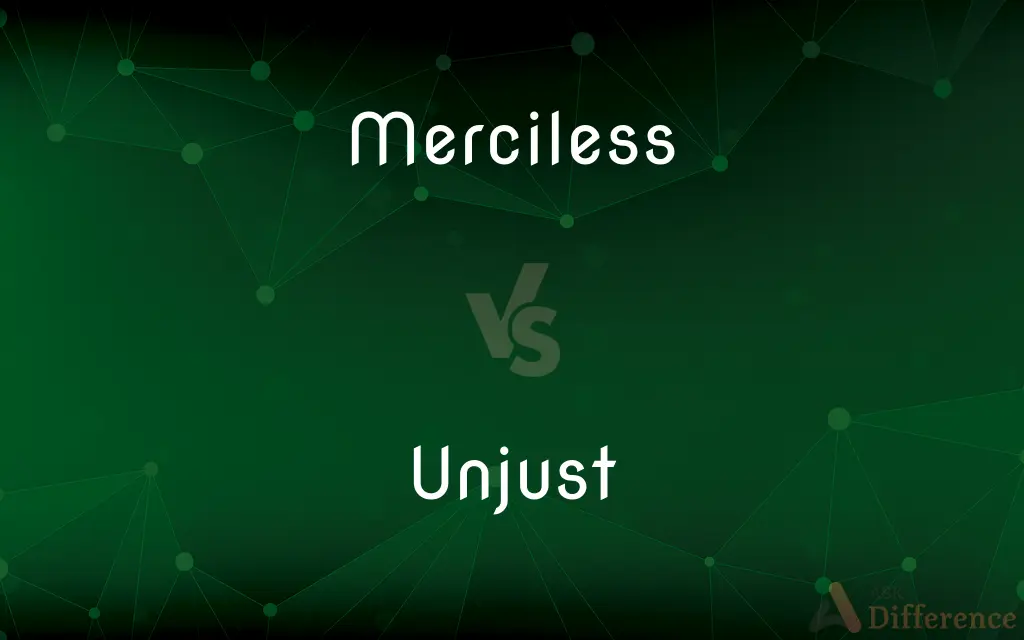Merciless vs. Unjust — What's the Difference?
By Tayyaba Rehman — Updated on September 24, 2023
"Merciless" refers to showing no mercy or pity, while "Unjust" pertains to a lack of fairness or justice.

Difference Between Merciless and Unjust
Table of Contents
ADVERTISEMENT
Key Differences
"Merciless" embodies an absence of compassion, often connoting a level of cruelty or severity in actions or decisions. In contrast, "Unjust" is inherently tied to principles of fairness, suggesting an action or decision is not in line with moral or ethical standards.
"Merciless" can be used to describe both people and situations. A merciless individual might not show leniency, while a merciless environment could be harsh and unforgiving. "Unjust", meanwhile, predominantly characterizes actions, decisions, or systems that do not uphold principles of fairness or justice.
For example, in a historical battle, if a winning army shows no quarter to the defeated, killing even those who surrender, they act in a "Merciless" manner. If a person is wrongly punished for a crime they did not commit, that is an "Unjust" act.
It's important to note that while both words can describe negative scenarios, they emphasize different aspects. "Merciless" highlights the hardness or lack of compassion, while "Unjust" underscores a departure from ethical norms or fairness.
Comparison Chart
Primary Connotation
Lack of mercy or compassion.
Lack of fairness or justice.
ADVERTISEMENT
Usage
Can describe people, actions, or situations.
Typically characterizes actions, decisions, or systems.
Associated Feelings
Cruelty, severity.
Inequity, discrimination.
Nature
Emotional or behavioral.
Moral or ethical.
Contextual Examples
Refusing to give aid; a harsh environment.
Wrongful punishment; biased systems.
Compare with Definitions
Merciless
Cruel or unsparing.
The dictator's merciless regime lasted for decades.
Unjust
Not based on or behaving according to fairness or justice.
The unjust treatment of the prisoners was condemned.
Merciless
Showing no mercy or pity.
The general was merciless in his conquest.
Unjust
Not right or lawful.
The unjust seizure of property was protested.
Merciless
Unrelenting or persistent.
The criticism was merciless.
Unjust
Acting contrary to moral standards.
The king's unjust actions led to a rebellion.
Merciless
Harsh or severe.
The desert can be a merciless environment.
Unjust
Discriminatory or biased.
The policy was seen as unjust to certain groups.
Merciless
Indifferent to suffering.
The merciless storm raged on.
Unjust
Not deserved or warranted.
The accusations were unjust.
Merciless
Merciless is a Swedish extreme metal band.
Unjust
Being in violation of principles of justice or fairness; unfair
An unjust law.
Merciless
Having no mercy; cruel.
Unjust
Acting in violation of such principles; unfair in one's dealings and actions
An unjust ruler.
Merciless
Showing no mercy; cruel and pitiless.
Unjust
(Archaic) Faithless; dishonest.
Merciless
Destitute of mercy; cruel; unsparing; - said of animate beings, and also, figuratively, of things; as, a merciless tyrant; merciless waves.
The foe is merciless, and will not pity.
Unjust
Not fair, just or right.
The solution was very unjust.
Merciless
Having or showing no mercy;
The merciless enemy
A merciless critic
Gave him a merciless beating
Unjust
Acting contrary to the standard of right; not animated or controlled by justice; false; dishonest; as, an unjust man or judge.
Unjust
Contrary to justice and right; prompted by a spirit of injustice; wrongful; as, an unjust sentence; an unjust demand; an unjust accusation.
Unjust
Not fair; marked by injustice or partiality or deception;
Used unfair methods
It was an unfair trial
Took an unfair advantage
Unjust
Violating principles of justice;
Unjust punishment
An unjust judge
An unjust accusation
Unjust
Not equitable or fair;
The inequitable division of wealth
Inequitable taxation
Unjust
Not righteous;
`unjust' is an archaic term for `unrighteous'
Common Curiosities
Is "Merciless" always negative in connotation?
Generally, yes. "Merciless" typically denotes a lack of compassion or pity.
Does "Unjust" imply immorality?
Yes, "Unjust" actions or decisions often conflict with moral or ethical standards.
Is every unjust act also merciless?
Not necessarily. An act can be unjust (unfair) without being merciless (cruel).
Can systems or structures be "Unjust"?
Yes, systems can perpetuate "Unjust" practices or biases.
Can a law be described as "Merciless"?
Yes, if the law is excessively harsh or unforgiving, it can be described as "Merciless".
How do "Merciless" and "Unjust" relate to authority figures?
Authority figures can be "Merciless" if they rule without compassion, and "Unjust" if they don't uphold fairness.
Can nature be "Unjust"?
While nature can be harsh, it's anthropomorphic to describe it as "Unjust". Nature is indifferent, not moral.
Can a verdict be "Merciless"?
A verdict itself isn't "Merciless", but the punishment resulting from it can be.
Is every merciless act also unjust?
Not always. An act can be merciless (without pity) without necessarily being unjust (unfair).
Are there positive connotations to "Merciless"?
Rarely. Though in certain contexts, being "Merciless" against challenges might imply determination.
Share Your Discovery

Previous Comparison
Decorate vs. Trim
Next Comparison
Tailor vs. SewerAuthor Spotlight
Written by
Tayyaba RehmanTayyaba Rehman is a distinguished writer, currently serving as a primary contributor to askdifference.com. As a researcher in semantics and etymology, Tayyaba's passion for the complexity of languages and their distinctions has found a perfect home on the platform. Tayyaba delves into the intricacies of language, distinguishing between commonly confused words and phrases, thereby providing clarity for readers worldwide.
















































